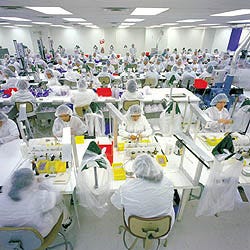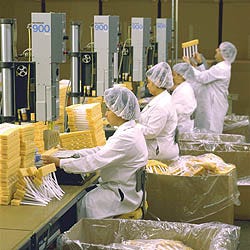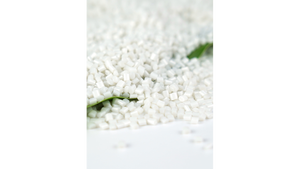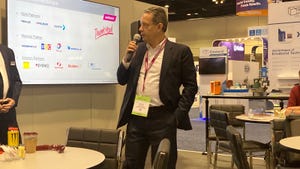March 1, 2002
|
Low-cost labor in one of Avail's three Tijuana cleanroom plants helped the company reduce the cost to manufacture a line of portable insulin-delivery devices. |
Mobile phone makers do it. Automotive companies do it. Computer and business equipment OEMs do it. So why can't medical OEMs subcontract their manufacturing to outside sources? Avail Medical Inc., headquartered in Dallas, TX, is out to eliminate the laundry list of reasons why they don't and establish a new standard in medical contract manufacturing. And with five plants in the U.S. and three facilities in Tijuana, Mexico, Avail is off to a running start.
J. Randall Keene, president of Avail, notes that medical contract manufacturing is an idea for which the time has come. "Any place where there are cost pressures, people will move to outsourcing," says Keene. That includes medical products. "We put together a plan to be 100 percent committed to make other people's products."
In fact, Avail has molding operations, including two plants in State College, PA, and plants in Asheville, NC, Dallas, TX, and San Diego, CA, with a total of 65 presses, but Keene stresses that Avail isn't a molding company. It is a medical device manufacturer, he says.
Keene says the company's goal is to make finished products rather than parts of products. "This single-minded focus makes us unique," Keene states. "We think that's the significant differentiating factor between Avail and medical molders. Cost pressures will continue to mount and the medical OEMs will continue to outsource."
To reassure its medical OEM customers of the company's position as a contract manufacturer, Avail promotes itself as a "silent partner" to its customers. "We want to support you, not compete with you," Keene tells Avail's customers.
The Evolution
Medical products companies have evolved over the past two decades from completely vertically integrated firms complete with molding capabilities to companies that assemble, test, market, and sell their products. It's been a series of baby steps for these giant medical OEMs, first divesting themselves of molding after deciding that custom molders equipped with cleanroom capabilities could provide the molded parts more cost effectively. Then, some subassembly operations were given to the molders that could prove FDA compliance.
Today, these companies are one step from doing what the major electronics companies are doing—subcontracting the entire manufacturing operation. The main benefit of this is that it leaves the OEM free to do what it does best: design and develop new products and get them to market.
Of course, some medical OEMs are still leery of the whole idea of subcontracting manufacturing. Avail tries to assuage this fear by emphasizing the company's scale of manufacturing capabilities. "For one customer we hired 450 people and installed 500 pieces of equipment for their cleanroom operation, all in a year," explains Tom Thompson, who retired at the end of 2001 as executive vp of business development for Avail. "It's our scale and experience that convinces customers we have the ability to do this."
Avail spent $1.5 million building and equipping one cleanroom facility. It took only one year from the project's start (six months from the start of production) before reaching the breakeven point. Keene notes that this is a strength OEMs look for when contracting their manufacturing. "Today's contract manufacturing model requires financial strength like this and it's something that a lot of molders just don't have," he adds.
In addition to setting up completely dedicated assembly operations, Avail will also consider purchasing its customers' manufacturing plants, a move modeled after the Flextronics and Solectron paradigm, says Keene.
|
Avail provides total contract manufacturing for medical OEMs, including heatstaking and assembly of components. |
More Than Just Manufacturing
Avail's new technical center in Dallas will allow the company to expand its engineering services to include design, validation, and verification of new products, thus adding to the scope of its capabilities. "Large medical companies often don't have enough resources or the in-house expertise to design for optimum manufacturability," notes Keene. With the Tech Center, he adds, "we provide the value engineering—design for manufacturability—by getting involved early in the cycle."
Another benefit to the medical OEM is the agility of a specialized firm. "We can respond to our customers' requests for changes, often more quickly and efficiently than they can internally," says Keene. In fact, establishing the engineering center gives Avail the ability to help speed its customers' time to market on new products, he adds. "One large potential customer told us they do eight new products a year. We do eight new products a month."
Keene says he believes medical OEMs will move more toward outsourcing as they continue to realize that R&D and branding are their forte. Also, as contract manufacturers increase their "scope and scale and become more capable," OEM confidence in the whole process will increase.
Of course, product design and development, and medical device manufacturing—as opposed to just molding components—carries larger liabilities and greater accountability for good manufacturing practices, or QSR (quality system regulation). Quality has become a major issue for Avail. "Our quality systems fit with the quality systems of the large medical OEMs. For one customer, we are one of six certified suppliers," adds Keene.
Avail also carries liability insurance to give it added protection. "The customer is always the manufacturer of record," explains Keene, "but what separates us from the small molding company is our willingness to take risks. To be successful, you have to do your business right."
Expanding With Success
It would appear, given the recent addition of a new cleanroom facility in Tijuana, Mexico, that Avail is doing something right. The plant is dedicated to a customer that is moving an entire plant from the Midwest into the 40,000-sq-ft facility, which is operated by Avail. This customer has approximately 2000 product codes that Avail must track and ship. The move from the Midwest to Tijuana will reportedly save this customer some $40,000 per day in manufacturing costs alone.
All of this, however, requires strong financial backing, which the company has. It also requires that everyone involved get past any notion that the phrase "cleanroom environment" is an oxymoron in Mexico. "When you're in one of our cleanroom assembly facilities, you don't know which country you're in," says Thompson.
In addition to assembly, the company-owned Tijuana operations (which now total four and are located in the same business park) have complete secondary capabilities that include RF and ultrasonic welding, laser sealing and cutting, bonding, sterilization management, and lamination, among others. Avail also provides MRP and documentation services and sterilization management services, warehousing, and shipping.
Avail's management team plans to grow the company "smart," keeping a "tight market focus" on medical devices for the surgical and fluid drug administration markets.
And the advantages for Avail's customers? "We help the customer be more competitive in its marketplace by reducing its costs to manufacture so it can be more competitive and focus on its core competencies," says Keene, "while providing the quality needed in this arena."
Contact information |
You May Also Like




